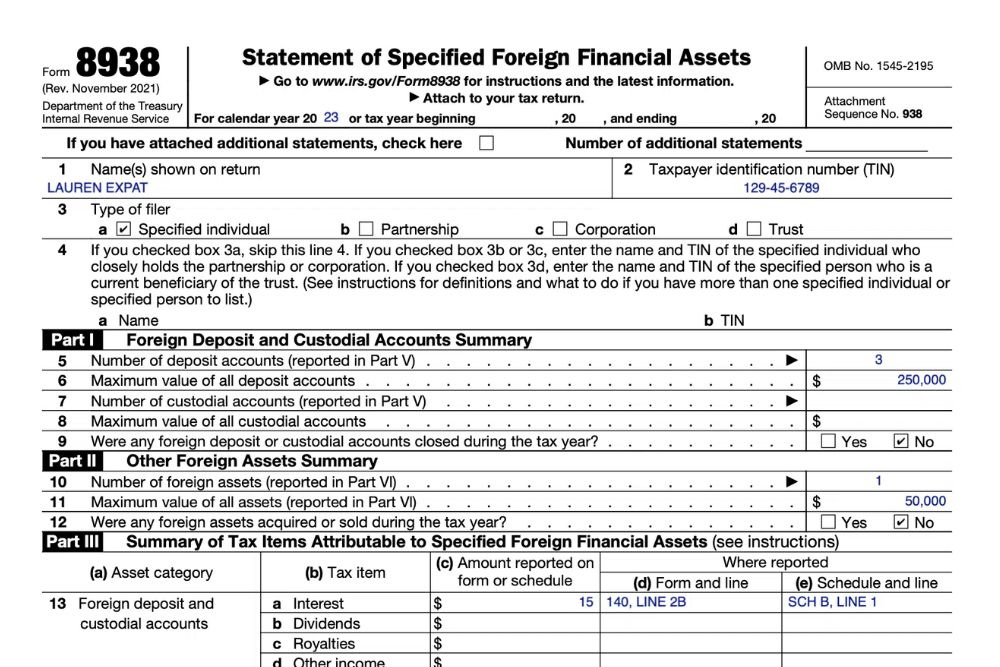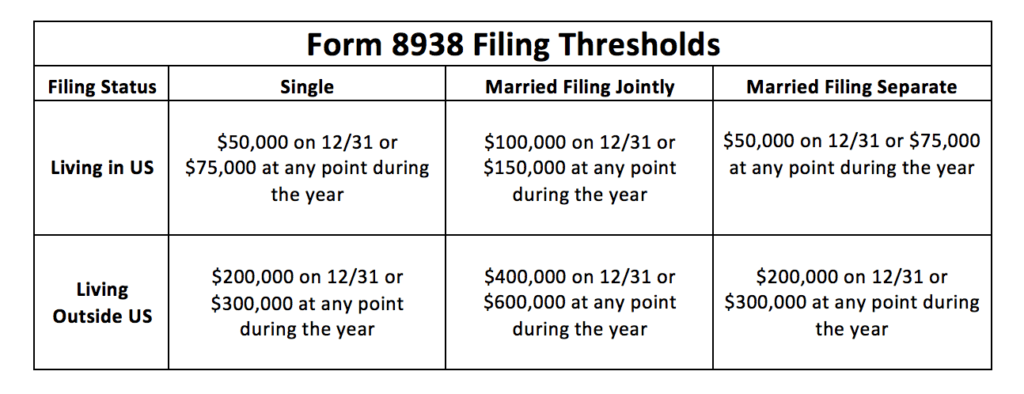The Expat’s Guide to IRS Form 8938 and FATCA Reporting

One of the most difficult expat tax forms to understand is Form 8938. For years, this form has been a thorn in the side of American taxpayers around the world. To help clear up this confusing topic, we’ve compiled everything you need to know about IRS Form 8938.
Key Takeaways
- Form 8938 is a mandatory informational tax form for certain US expats and used to report your foreign financial accounts.
- Failing to file Form 8938 when required can result in severe penalties.
What Is Form 8938?
Form 8938 is an informational IRS tax form that was created as part of the Foreign Account Tax Compliance Act (FATCA), which was passed into law in 2010. The purpose of the form is to alert the IRS that an individual has received certain types of foreign assets.
US persons who own foreign financial assets valued above certain thresholds must file this form to report those assets. Common examples of foreign financial assets include:
- Foreign bank accounts
- Foreign brokerage accounts
- Foreign financial instruments
- Foreign-issued life insurance
- Foreign annuity contracts with cash value
- Shares in foreign hedge funds and private equity funds
This form is required under the rules of the Foreign Account Tax Compliance Act (FATCA). FATCA is designed to prevent taxpayers from hiding their assets and income overseas to avoid taxation.
While this form is similar to the FBAR, they are not the same. Understanding the differences can be crucial for expat tax compliance.
Who Has to File this Form?
The threshold for filing Form 8938 depends on your residency and filing status.
For US persons living in the US, the thresholds for filing are:
- Single or Married Filing Separately: You must file Form 8938 if the total value of your foreign assets is greater than $50,000 on the last day of the tax year or more than $75,000 at any point during the year.
- Married Filing Jointly: You must file Form 8938 if the total value of the foreign assets you and your spouse own is greater than $100,000 on the last day of the tax year or more than $150,000 at any point during the year.

For US persons living outside of the US, the thresholds for filing are:
- Single or Married Filing Separately: You must file Form 8938 if the total value of your foreign assets is greater than $200,000 on the last day of the tax year or more than $300,000 at any point during the year.
- Married Filing Jointly: You must file if the total value of the foreign assets you and your spouse own is greater than $400,000 on the last day of the tax year or more than $600,000 at any point during the year.
Refer to the table below for a summary of these rules.

What Information Is Reported on Form 8938?
Form 8938 requires that the filer report information about foreign accounts and assets, including:
- The account’s name, address, and taxpayer identification number (TIN)
- The account holder’s name, address, country of residence (if different), TIN
You will also list any income earned from each account during that year. This income should match what you report on Schedule B (interest and dividends) of your income tax return.
Form 8938 Due Date
Form 8938 must be filed along with your income tax return (Form 1040) and is due at the same time. In most cases, that would mean the deadline is April 15th of every year. However, expats receive an automatic two-month extension to June 15th. If necessary, you can also request an additional filing extension until October 15th or even December 15th.
An extension to file is not an extension to pay. Regardless of your extension, you will still have to estimate and pay your annual taxes by the original April deadline.
What Are the Penalties for Failing to File this Form?
Failing to file Form 8938 when required can result in severe penalties. The standard penalty is a fine of $10,000 per year. If the IRS notifies taxpayers that they are delinquent, they will have 90 days to comply. If they continue to refuse, they may be fined an additional $10,000 for every 30 days of noncompliance, up to a maximum of $50,000. (This $50,000 maximum does not include the original $10,000 per year.)
On top of this, the IRS says that “underpayments of tax attributable to non-disclosed foreign financial assets will be subject to an additional substantial underpayment penalty of 40%.”
In very rare instances, criminal penalties may also apply. The moral of the story is that you should always file this form when required.
How to File Form 8938
Form 8938 is a supplemental form, which means it must be filed with your federal income tax return. It should be attached to page 1 of Form 1040 or Form 1040NR.
Form 8938 consists of six parts.
- Part I is used to report financial accounts.
- Part II is used to report other types of financial assets, such as stocks, bonds, and other financial instruments.
- Part III is a summary of any income derived from your foreign financial assets.
- Part IV is a summary of any financial assets that are exempted from Form 8938 reporting because you have already reported them elsewhere on your tax return.
- Parts V and VI are used to report further details about your foreign accounts and financial instruments.
For more information, see the instructions for Form 8938 provided on the IRS website. An example of Form 8938 can be seen below.

While this may sound simple, Form 8938 is an especially complicated tax form to complete. Even determining whether you are required to file this can be a complex process. We do not recommend attempting to file Form 8938 without the help of a qualified tax professional.
Want Help Filing Form 8938? We Can Help!
We hope this guide has helped you understand the requirements and instructions for Form 8938. However, expat taxes are nothing, if not complex. If you still have questions, we have the answers you need. In fact, we can even prepare and file Form 8938 on your behalf.
Have questions about the process or next steps? Contact us, and one of our Customer Champions will happily address all your concerns. If you’re ready to be matched with a Greenback accountant, click the get started button below.




